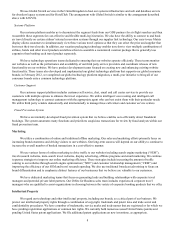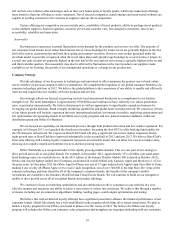Orbitz 2012 Annual Report Download - page 18
Download and view the complete annual report
Please find page 18 of the 2012 Orbitz annual report below. You can navigate through the pages in the report by either clicking on the pages listed below, or by using the keyword search tool below to find specific information within the annual report.18
As a result, we may operate our business differently than if we were not subject to these covenants and restrictions.
Our revenue is derived from the travel industry and prolonged substantial decreases in travel volume, particularly air travel,
as well as other industry trends, have historically adversely affected, and may in the future adversely affect, our business,
financial condition and results of operations.
Our revenue is derived from the worldwide travel industry. As a result, our revenue is directly related to the overall level
of travel activity, particularly air travel and hotel volume, and is therefore significantly impacted by declines in or disruptions to
travel in the United States, Europe and the Asia Pacific region due to factors entirely outside of our control. For example, the
deterioration of the capital markets and related financial crisis in the second half of 2008 negatively impacted consumer
spending patterns, including spending on travel, thereby reducing demand for our products and decreasing our revenue. While
we have seen improvements in the economy in recent years, economic conditions remain unstable. If economic conditions do
not continue to improve, or worsen, our results of operations and financial condition could be materially adversely impacted.
Additional factors that affect our revenue include:
• global security issues, political instability, acts or threats of terrorism, hostilities or war and other political issues that
could adversely affect travel volume in our key regions;
• epidemics or pandemics;
• natural disasters, such as hurricanes, volcanic eruptions and earthquakes;
• the financial condition of suppliers, including the airline and hotel industry, and the impact of their financial
condition on the cost and availability of air travel and hotel rooms;
• changes in airline distribution policies;
• changes to regulations governing the airline and travel industry;
• an increase in fuel prices affecting travel;
• work stoppages or labor unrest at any of the major airlines or airports;
• increased airport security that could reduce the convenience of air travel;
• travelers' perceptions of the occurrence of travel related accidents or the scope, severity and timing of the other
factors described above; and
• changes in occupancy and room rates achieved by hotels.
If there is a prolonged substantial decrease in travel volumes, particularly for air travel and hotel stays, for these or any
other reasons, it would have an adverse impact on our business, financial condition and results of operations.
Our business and results of operations could be adversely affected if one or more of our major suppliers, including airlines
and car rental companies, suffers a deterioration in its financial condition or it restructures its operations.
In the past several years, several major airlines have filed for bankruptcy protection, recently exited bankruptcy, or
discussed publicly the risks of bankruptcy. In addition, some of these airlines and others have merged, or discussed merging,
with other airlines. In addition, the economic downturn severely impacted the automobile industry, including car rental
companies. We depend on a relatively small number of airlines for a significant portion of our net revenue. Our car net revenue
is also generated from a relatively small number of car rental companies. As a result of this dependence, our business and
results of operations could be adversely affected if the financial condition of one or more of the major airlines or car rental
companies were to deteriorate or in the event of supplier consolidation in either of these industries. For example, further
consolidation of one or more of the major airlines, such as the announced merger of American Airlines and US Airways could
result in further capacity reductions, a reduction in the number of airline tickets available for booking on our website and
increased air fares, which may have a negative impact on demand for travel products.
The travel industry is highly competitive, and we may not be able to effectively compete in the future.
We operate in the highly competitive travel industry. Our success depends, in large part, upon our ability to compete
effectively against numerous competitors, including other online travel companies, traditional offline travel companies,
suppliers, travel research companies, search engines and meta-search companies, several of which have significantly greater
financial, marketing, personnel and other resources than we have, as discussed below. Factors affecting our competitive success
include price, availability of travel products, ability to package travel products across multiple suppliers, brand recognition,
customer service and customer care, fees charged to customers, ease of use, accessibility, reliability and innovation. If we are
not able to compete effectively against our competitors, our business and results of operations may be adversely affected.
























